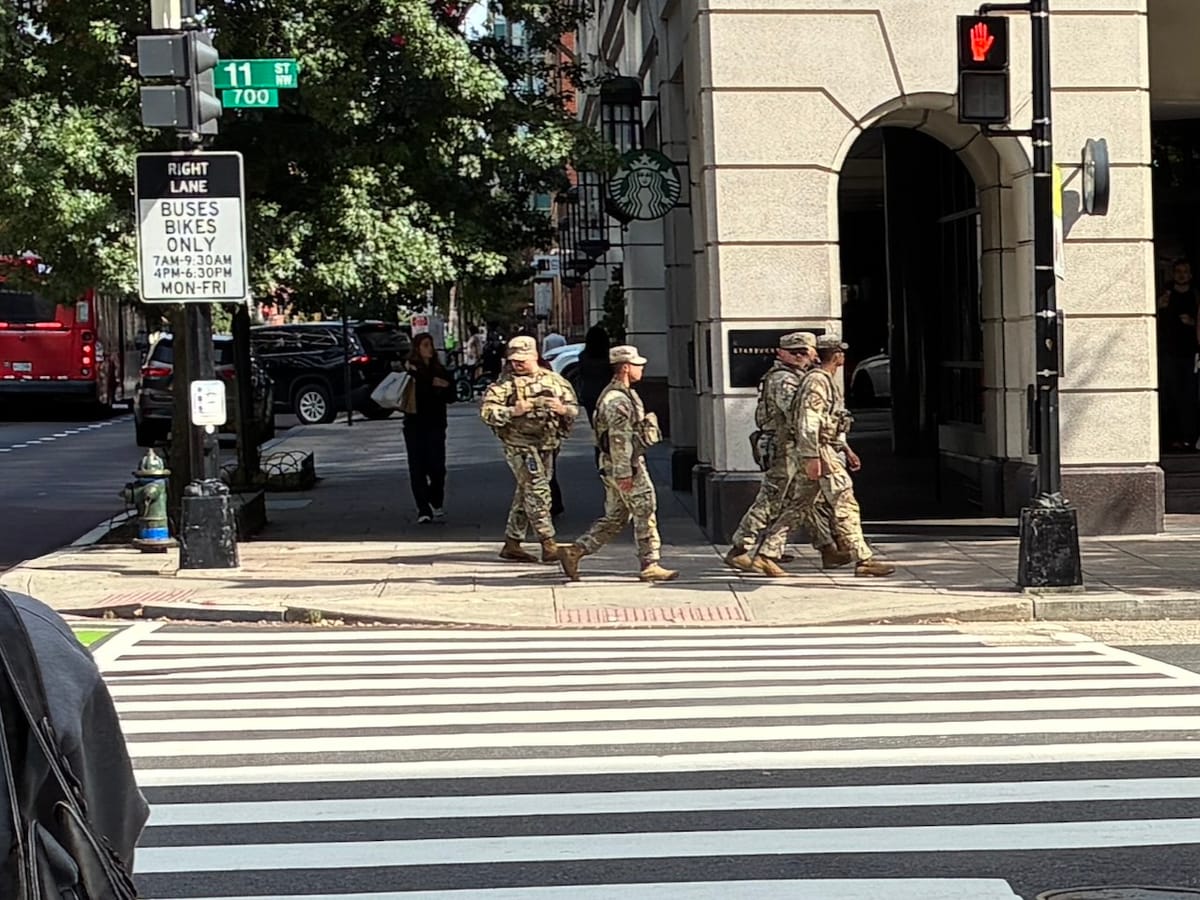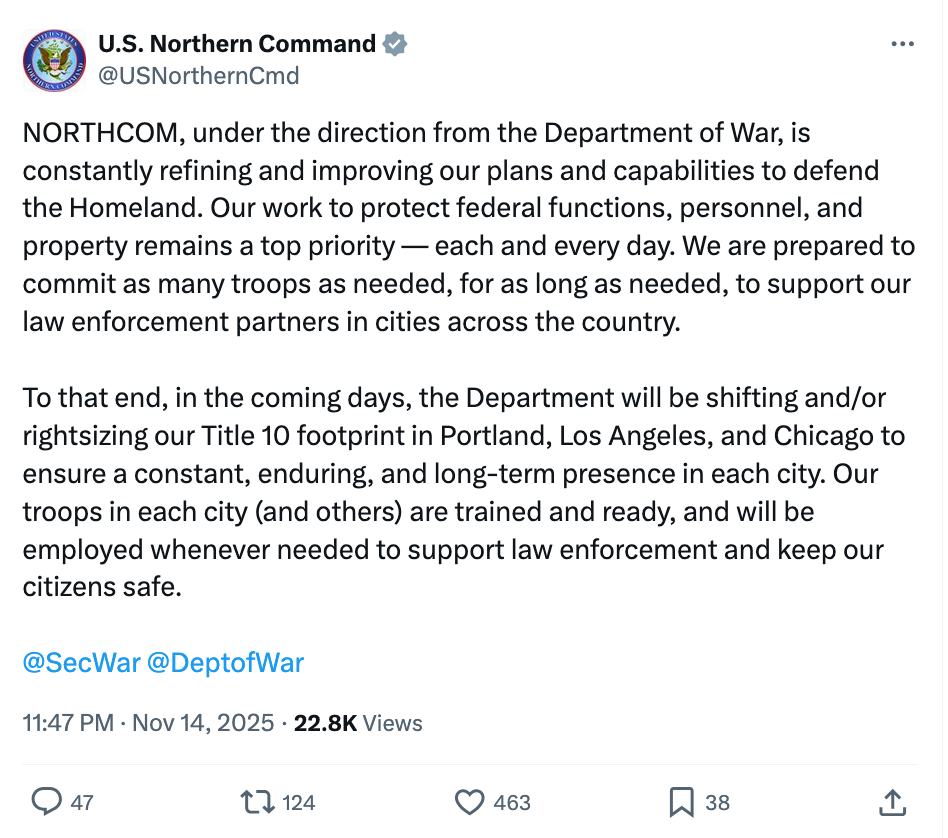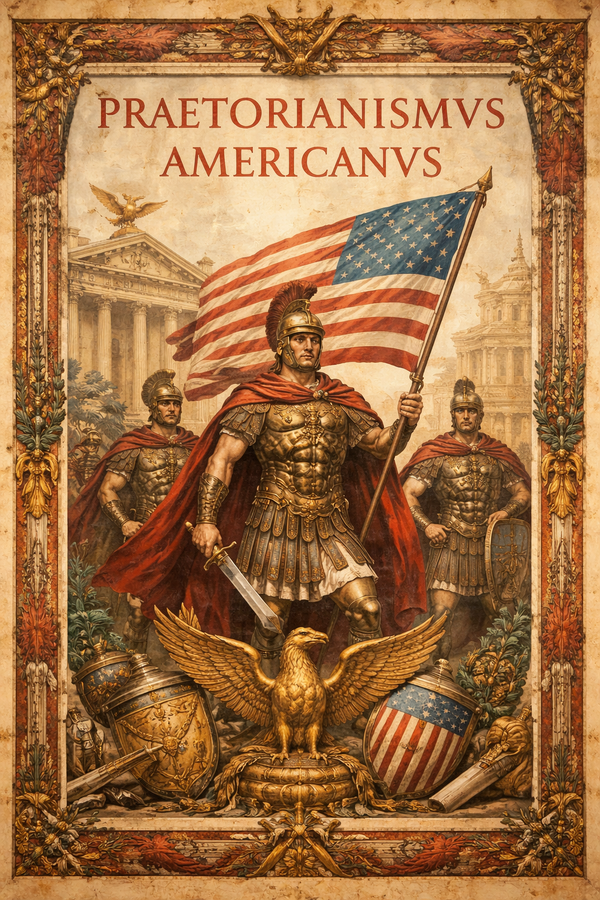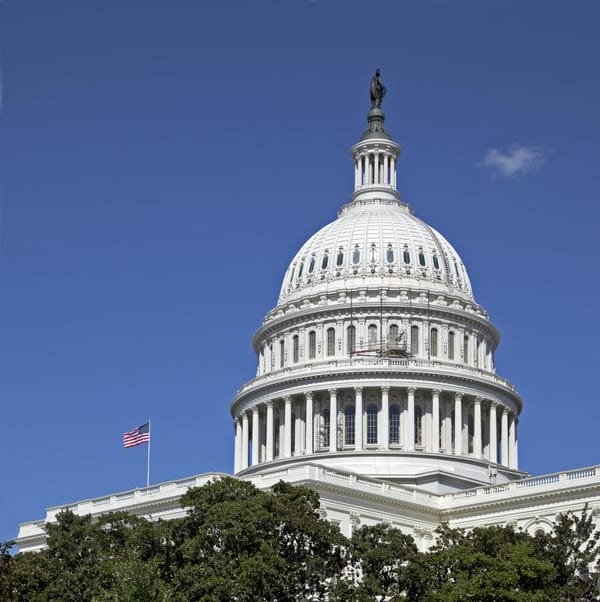The National Guard Must Not Become A Praetorian Guard

Trump v. Illinois is currently on the Supreme Court's "shadow docket." If the GOP-appointed majority should rule that Trump can use the National Guard (NG) as he sees fit for dealing with objectively nonexistent "rebellions," he will see it as a license to use loyal Red state NG elements (and perhaps even active duty troops) against political opponents fomenting "civil unrest" when they protest Trump's policies and actions, just as Roman emperors used their Praetorian Guard to crush their enemies.
Perhaps one can call it "martial law lite," but whatever adjective one settles on one thing is clear: Donald Trump is attempting to normalize the Orwellian.
I'm speaking about last night's announcement by the U.S. Northern Command (NORTHCOM) that federal troops--either mobilized NG elements or perhaps even active duty units--are to become a permanent fixture in certain American cities so long as Trump remains in office:

What's not publicly known at present is whether NORTHCOM commander General Gregory M. Guillot or any members of the Joint Chiefs of Staff (JCS) advised Defense Secretary Hegseth or Trump against the decision to permanently deploy federal troops in major cities run almost exclusively by Democratic Party politicians. As of Sunday night (November 16), there had been no senior officer resignations at NORTHCOM or the JCS over this new militarization of American domestic political life.
The policy edict comes just one day before a Supreme Court deadline for final legal briefs to be filed by the state of Illinois and the Trump regime in what is now likely to become one of the most important cases on the scope of presidential power in decades.
Because the case involving Trump's attempts to mobilize both Illinois and Texas National Guard elements for pretextual immigration enforcement or crime control operations in and around Chicago has had some twist and turns over the last six weeks, I think it wise to lay out the timeline of events first, then turn to the legal and political stakes involved.
Timeline of the Illinois National Guard Deployment Case
October 4, 2025: Trump federalized approximately 700 NG troops—300 from the Illinois National Guard and 400 from the Texas National Guard—for deployment to the Chicago area, ostensibly to protect immigration agents during Operation Midway Blitz.
October 6, 2025: The state of Illinois and the city of Chicago filed a lawsuit against the Trump administration, seeking to block the NG deployment.
October 9, 2025: U.S. District Judge April Perry issued a temporary restraining order (initially for two weeks, later extended indefinitely) barring the Trump administration "from ordering the federalization and deployment of the NG of the United States within Illinois". In her accompanying opinion, Perry wrote that the Trump administration had "made no attempt to rely on the regular forces" before federalizing the NG and had not argued that the president could not execute the laws with only the "regular forces".
October 16, 2025: The 7th U.S. Circuit Court of Appeals upheld Perry's order blocking Trump from deploying the NG to Chicago, ruling that her findings were not "clearly erroneous" and that "the facts do not justify" Trump's actions in Illinois.
October 17, 2025: U.S. Solicitor General D. John Sauer came to the Supreme Court, asking the justices to intervene and put Perry's order on hold. This marked the first time the justices had been asked to weigh in on Trump's National Guard deployment efforts.
October 20, 2025: Illinois and Chicago filed their 46-page response to the Supreme Court, arguing it would be "inappropriate for the high court to get involved at this stage" and that Trump's lawyers offered "no meaningful response" to the factual basis for Perry's order.
October 29, 2025: The Supreme Court took the rare step of requesting additional briefing, asking both parties to address "whether the term 'regular forces' refers to the regular forces of the United States military, and, if so, how that interpretation affects the operation" of 10 U.S.C. § 12406(3). In a signal that the Supreme Court isn't in a hurry to rule, the justices indicated they won't decide the case until at least November 17.
The Court's order came after lawyers for the Trump administration notified the justices of the decision by the 9th U.S. Circuit Court of Appeals to rehear "en banc" a case over NG deployment in Portland, Oregon, meaning the two circuits could eventually align on the issue.
November 11, 2025: Both the Trump administration and Illinois/Chicago filed their supplemental briefs responding to the Supreme Court's question about what constitutes the "regular forces" of the United States government.
Several groups filed amicus briefs: The ACLU, Knight First Amendment Institute and other civil rights organizations argued Trump's deployments were "incompatible with our nation's ideals and threaten to suppress countless Americans' exercise of First Amendment rights." Two dozen former federal judges filed a brief supporting rejection of Trump's appeal to preserve judicial authority to determine when a president has exceeded constitutional and statutory authority.
November 17, 2025: Reply briefs due from both parties. A decision on the government's request to pause Perry's order could come at any time after November 17.
The Stakes: Legal and Political
The key statute at issue is 10 U.S.C. § 12406, with the Trump regime disingenuously asserting that the protests at the Broadview, IL ICE facility constitute "rebellion" against the federal government.
I'll note that the term "rebellion" or the phrase "rebellion against the authority of the Government of the United States" are not defined in the statute. But I think common sense would tell the genuinely objective observer that the protests at Broadview and other ICE facilities around the country have, in some isolated cases, involve trespass, disorderly conduct, or other infractions that are generally misdemeanors under state and even federal law--not an attempt to overthrow the federal government.
An actual example of rebellion or sedition against the lawfully constituted government of the United States happened on January 6, 2021, when a mob of thousands of Trump supporters overran the Capitol, attempted to stop the certification of the 2020 presidential election results, and threatened to "hang [Vice President] Mike Pence" for refusing to go along with Trump's attempted coup.
With respect to what exactly constitutes the "regular forces" of the United States, Solicitor General Sauer argued that "regular forces" refers to "civilian forces that regularly 'execute the laws' at issue but are 'unable' to do so in present circumstances," not the standing military. If you search Westlaw or any other legal source for a case in which a federal government lawyer has made a similar claim that civilian law enforcement personnel are the "regular forces" mentioned in the statute, you'll come up empty.
Illinois adopted Georgetown University law professor Martin Lederman's argument that "regular forces" refers to the normal armed forces of the United States military. This has literally been the understanding and the official policy of the United States since 1775.
But despite the Supreme Court's order that the parties in Trump v. Illinois address the meaning of the term "regular forces," I think the final outcome in this case will rest on whether the current Court elects to uphold a prior high court decision that seemingly grants a president literally unreviewable authority to call up the National Guard.
Sauer argued that "the President's determination to call up the National Guard is a core exercise of his power as Commander in Chief" and is "not judicially reviewable at all; at minimum, it is entitled to extremely deferential review."
Here, Sauer is drawing on a nearly 200-year-old Supreme Court case, Martin v. Mott, which involved a New York civilian and militia member who refused a call up order under the Militia Act of 1795 during the war of 1812. In deciding the case against defendant Jacob Mott, the Supreme Court stated that with respect to militia call up orders, the power to do so was "exclusively vested in the President, and his decision is conclusive upon all other persons."
Yet there was no such sweeping language in either the Militia Act of 1795 or in 10 U.S.C. § 12406. In the Mott decision, the Supreme Court invented out of whole cloth a doctrine with absolutely no basis in the plain text of the Constitution. It was also a decision totally at odds with the intent of the Founders that America's chief executive be one invested with limited powers and primarily responsible for carrying out the legislative edicts of Congress.
On rare occasions, the Supreme Court has repudiated precedents expanding presidential power that have aged poorly in the court of public opinion.
In its June 2018 decision in Trump v. Hawaii, the Court majority responded to Justice Sotomayor’s invocation of the infamous Japanese American internment case of Fred Korematsu to state that "The forcible relocation of U. S. citizens to concentration camps, solely and explicitly on the basis of race, is objectively unlawful and outside the scope of Presidential authority...The dissent’s reference to Korematsu, however, affords this Court the opportunity to make express what is already obvious: Korematsu was gravely wrong the day it was decided, has been overruled in the court of history, and—to be clear—“has no place in law under the Constitution.”
Unfortunately, the proclivity of federal courts, and especially this current Supreme Court, to show a constitutionally unsupported deference to presidential assertions of authority in national security or law enforcement matters is as deeply rooted as it is misguided. I fear that before we sit down to enjoy our Thanksgiving dinners with family and friends that at least five and perhaps all six of the GOP appointees to the Court will affirm that the Mott decision applies to Illinois v. Trump.
If that happens, Trump's only obstacle to creating a 20,000+ National Guard Quick Reaction Force to quell "civil unrest" will be money. The idea that Trump could potentially use tens of thousands of mobilized American troops to politically or even physically intimidate political opponents, or worse attack protesters engaged in First Amendment protected speech, is beyond chilling...which is why Senate Democrats need to grow a political spine and fight Trump's attempts to create his own Praetorian Guard before it's too late.
REMINDER: You can get 30% off my new book about past episodes of unconstitutional surveillance and political repression, the Triumph of Fear, by going directly to the Georgetown University Press website and using the code TGUF...and this code can be used by anybody, so spread the word and thanks for being a Sentinel subscriber!





